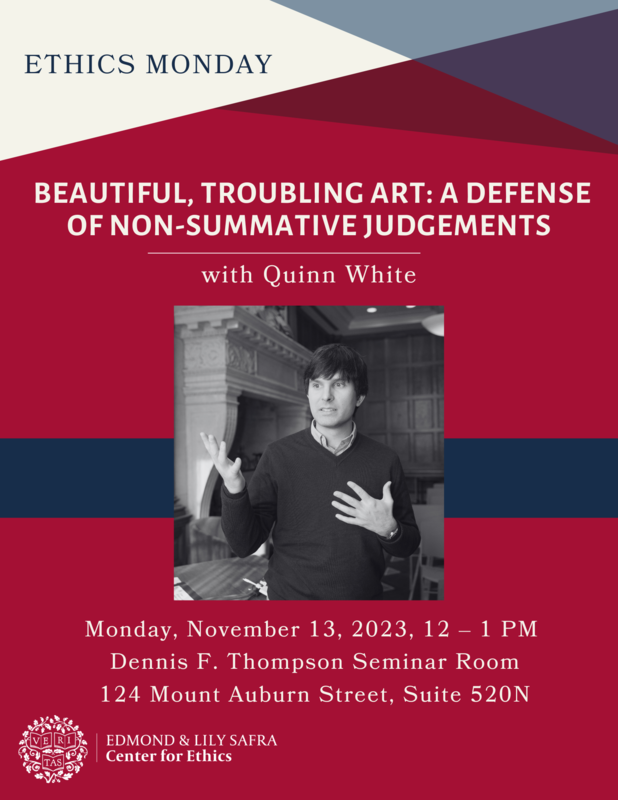Date:
Location:

Please join the Edmond & Lily Safra Center for an Ethics Monday discussion with Professor Quinn White on "Beautiful, Troubling Art: A Defense of Non-Summative Judgments."
Register for in-person and online attendance here
Title: Beautiful, Troubling Art: A Defense of Non-Summative Judgements
Description: Do the ethical features of an artwork bear on its aesthetic value? When we say a movie endorses misogyny, a song is a civil rights anthem, the clay constituting this statue was extracted with underpaid labor, are facts like these the proper bases for aesthetic evaluation? Put another way, is unethical art ipso facto bad, or at least worse, art? As presented, neither a straight forward “yes” or “no” answer is especially appealing. On the one hand, White argues we should embrace the idea that artwork has ethical dimensions and that they matter to the value of work as art; at the same time, we should be averse to a kind of reductive treatment of the value of art that sees its ethical and non-ethical dimensions as determinative of some univocal, overall aesthetic value. Toni Morrison described The Adventures of Huckleberry Finn as an “amazing, troubling book”; her aesthetic evaluation is ethically laden, but she refuses to see the book as any less amazing because it is troubling. Taking Morrison as a paradigmatic case, White defends the place of such “non-summative” judgements—which take account of ethical and non-ethical dimensions of a work but refuse to “sum them up” into a verdictive judgement—about art. In so doing, he draws on other areas in which non-summative judgement seems especially called for, including evaluations of people.
Speaker Bio: Quinn White received his Ph.D. from MIT and taught at the University of Nebraska–Lincoln before joining the faculty of the philosophy department at Harvard in the fall of 2022. White's research focuses on the ethics of love and relationships, which, he argues, is pretty much all of ethics. He is interested in interpersonal relationships, and has projects in honesty and discretion, partiality, consent, paying it forward, and forgiveness, as well as more applied projects on deception in the social science research and the politics of technology and privacy. He is also interested in love and the special permissions and obligations it can bring. And, perhaps more strangely, he explores the idea that love of all, agape, can serve as a (even the) central ideal of practical reasoning.
This event is hybrid and open to the Harvard community.
